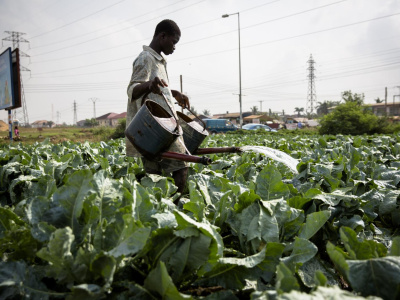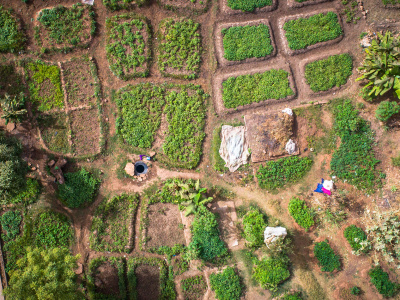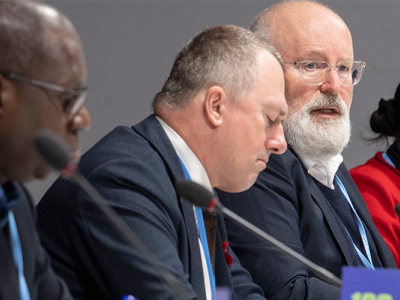
A reality check for Europe-Africa climate diplomacy
Authors
Europe and Africa are struggling to find common ground in the run-up to COP27 in Sharm-el-Sheikh, Egypt, at a time when climate change continues to wreak havoc on people’s lives throughout Africa.
In a world of increasing carbon emissions, geopolitical conflict, record inflation, rising energy and food prices and a growing debt crisis, many African countries lack the resources to deal with the repercussions of climate change. Europe-Africa cooperation has been instrumental for global climate action in the past. Can the two continents come together in the upcoming negotiations?
The significance of an African COP
In early October, the Democratic Republic of the Congo (DRC) organised the Pre-COP27. The last political deliberation ahead of COP27 offered African countries a platform to put their priorities and grievances on the table: the industrialised countries’ inability to meet their 2009 pledge of $100 billion annual climate finance, ensuring carbon market returns for Africa, and getting a commitment on payments for loss and damage.
COP26 largely failed to produce progress on developing countries’ concerns. COP27 will need to do better to avoid further breakdown of the process.
In recent years, the African continent, responsible for less than 4% of global emissions, has come forward with a strong, unified position on its needs. The African Union’s Climate Strategy (2022-2032) unequivocally asks for support for adaptation. African countries are also calling for a just transition that supports their right to develop, including by leveraging their fossil fuel reserves, particularly natural gas. In July, for example, the DRC launched bids for thirty oil and gas blocks in sensitive ecological areas.
Europe in crisis mode
Since 2019, the EU has been on a bumpy, but still credible path to decarbonisation and climate protection. The EU's 2021-2027 budget allocates at least 30% of €79.5 billion to support climate action, including adaptation. This is in line with the objectives enshrined in the European Climate Law and the Fit-for-55 package, to reach climate neutrality in the Union by 2050, and reduce net greenhouse gas emissions by at least 55% by 2030, from 1990 levels.
But today, Europe is in a deep crisis. The Russian war in Ukraine reveals existing cracks in the Europe-Africa partnership.
The EU’s abrupt change of position on natural gas, coal and nuclear power invites accusations of hypocrisy, especially as African countries are struggling to finance their fossil fuel projects, while Africa’s rather tepid support for Ukraine in the UN, is showing that the EU cannot take these partnerships for granted.
The future international implications of the European Green Deal are also starting to show. The EU’s Carbon Border Adjustment Mechanism (CBAM) is emerging as the symbol for what is seen as a deeply unfair and unilateral EU foreign policy, and how European climate policy threatens African industrial development and could eventually price African goods out of global markets.
The war against Ukraine is also testing Europe’s commitment to global climate action, as foreign aid and climate budgets are increasingly under pressure, with major redirections towards Ukraine and internal spending by some European countries.
This risks further deepening the gap between the demand and supply of global climate finance. The EU and its member states together are by far the largest contributor to global climate finance, including for adaptation, yet the world is still far from the $100 billion per year target, let alone the $15 billion per year that Africa needs to adapt to the adverse impacts of climate change.
Finding unity in a multipolar world
COP27 will take place during a burning crisis of multilateralism, a reconfiguration of global energy geographies and the threat of nuclear war.
To maintain its climate leadership role, the EU will need to rebuild its own unity and rethink its alliances with others.
The EU should avoid at all costs turning inward-looking. It should work with and not just in Africa towards an effective and fair climate protection agenda. Not doing so can disrupt international trade and financial markets, displace vulnerable people or escalate conflict. If left unaddressed, these ‘transboundary climate impacts’ can lead to a further breakdown of the global climate agenda.
Avenues for Europe-Africa climate diplomacy at and beyond COP27
The G7 is one arena in which greater ambition can be nurtured. In June, the G7 leaders announced the establishment of a Climate Club, as an intergovernmental forum of high ambition to support the implementation of the Paris Agreement. Together with the V20 group of finance ministers from climate-vulnerable economies, they will provide support to loss and damage, picking up where COP26 failed to deliver.
Climate finance, including adaptation finance will be a major element of the negotiations. The EU’s draft position for COP27 emphasises adaptation in least-developed countries (LDCs). The EU member states also expect that the $100 billion climate finance goal will be reached in 2023 and are aiming for a 50% allocation for adaptation.
Innovative finance will be key for closing the climate finance gap, enabling a just energy transition and supporting ambitious action on adaptation.
All EU institutions and the European Investment Bank must work together to further lift the barriers to adaptation investment. The EU is well placed to use blending and de-risking mechanisms to facilitate private sector participation. Extra efforts are needed to ensure that adaptation-related investments reach the poorest, rural communities in Africa. European finance can also build on African initiatives like the Rwandan Green Fund to encourage climate (adaptation) finance from the private sector. These types of initiatives are evidence of African countries increasingly looking into mobilising their own resources to support climate adaptation. However, due to heavy national indebtedness, this will not be easy.
Given the scale of required climate and adaptation finance, the EU may have to rethink what it considers climate finance. For instance, the question of whether funding for agricultural research and development (e.g. under HorizonEurope programmes), with a higher benchmark for adaptation in food systems in developing countries, can count towards climate finance can be part of the debate on new types of adaptation finance.
Europe can also play an important role in facilitating debt restructuring for climate objectives. This includes scaling up specific instruments like debt-for-climate swaps and an open discussion on using carbon credits of low-emitting countries for debt forgiveness.
To bridge the deep waters between both, the EU will need to balance its narrative on natural gas and work with African institutions and countries to help conceptualise a future-proof, but Africa-specific approach to transition fuels, ensuring that any future investments enable renewable energy deployment, and minimise the risk of stranded assets.
The EU will also need to manage the (unintended) consequences of its transition, ensuring for example that future CBAM revenues are re-invested to support industry transition, and clean economic development, especially in LDCs. This would go a long way to help ease tensions in climate diplomacy with African countries.
The UNFCCC format is not well-suited for radical change and a large-scale breakthrough on all the above is unlikely to transpire in Sharm-El-Sheikh. Realistically, we can wish for a summit during which European and African negotiators do not lose sight of the 1.5 degrees target and find common ground on a just energy transition, adaptation finance and loss and damage.
The past has already shown that Europe and Africa can align their agendas: the 2011 COP17 in Durban or the 2015 COP21 in Paris were once concluded with considerable success, and prolific Europe-Africa climate diplomacy was claimed to be one of the reasons for that. And hopefully, by COP28 the geopolitical situation will facilitate a positive outcome.
The views are those of the authors and not necessarily those of ECDPM.







